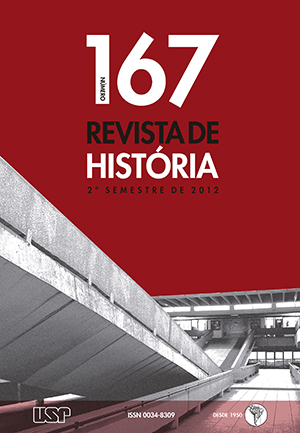Foreign Policy, Agrarian Unrest, and Missionary Praxis: the Italian Capuchins and the Relations Between Brazil and the Vatican at the Beginning of the Second Empire
DOI:
https://doi.org/10.11606/issn.2316-9141.v0i167p193-222Keywords:
Capuchinhos italianos – Pernambuco – relações Estado-Igreja – Sacra Congrega- ção da Propaganda Fide – Placido de Messina – Caetano de Messina.Abstract
This article deals with the role played by the Sacred Congregation of Propaganda Fide’s Apostolic Missions in the political relations between the Empire of Brazil and the Holy See. Based mainly on Vatican sources, the text follows the negotiations between the Brazilian State, the Roman Curia, the Brazilian bishops, and the Italian Friar Capuchin Missions, in search of a common ground to solve institutional policy problems as well as the definition of power spheres between the State and the Catholic Church for the missionary practice to take place. Agreements were reach in the context of a threatening series of insurrections and revolts performed by communities of free men and women in the Northeastern countryside.Downloads
Download data is not yet available.
Downloads
Published
2012-12-30
Issue
Section
Articles
License
Autores que publicam nesta revista concordam com os seguintes termos:
- Autores mantém os direitos autorais e concedem à revista o direito de primeira publicação, com o trabalho simultaneamente licenciado sob a https://creativecommons.org/licenses/by/4.0/ (CC BY). Esta licença permite que outros distribuam, remixem, adaptem e criem a partir do seu trabalho, mesmo para fins comerciais, desde que lhe atribuam o devido crédito pela criação original. É a licença mais flexível de todas as licenças disponíveis. É recomendada para maximizar a disseminação e uso dos materiais licenciados.
- Autores têm autorização para assumir contratos adicionais separadamente, para distribuição não-exclusiva da versão do trabalho publicada nesta revista (ex.: publicar em repositório institucional ou como capítulo de livro), com reconhecimento de autoria e publicação inicial nesta revista.
- Autores têm permissão e são estimulados a publicar e distribuir seu trabalho online (ex.: em repositórios institucionais ou na sua página pessoal) a qualquer ponto antes ou durante o processo editorial, já que isso pode gerar alterações produtivas, bem como aumentar o impacto e a citação do trabalho publicado (veja O Efeito do Acesso Livre).
How to Cite
PALACIOS, Guillermo. Foreign Policy, Agrarian Unrest, and Missionary Praxis: the Italian Capuchins and the Relations Between Brazil and the Vatican at the Beginning of the Second Empire. Revista de História, São Paulo, n. 167, p. 193–222, 2012. DOI: 10.11606/issn.2316-9141.v0i167p193-222. Disponível em: https://www.journals.usp.br/revhistoria/article/view/49088.. Acesso em: 18 may. 2024.







